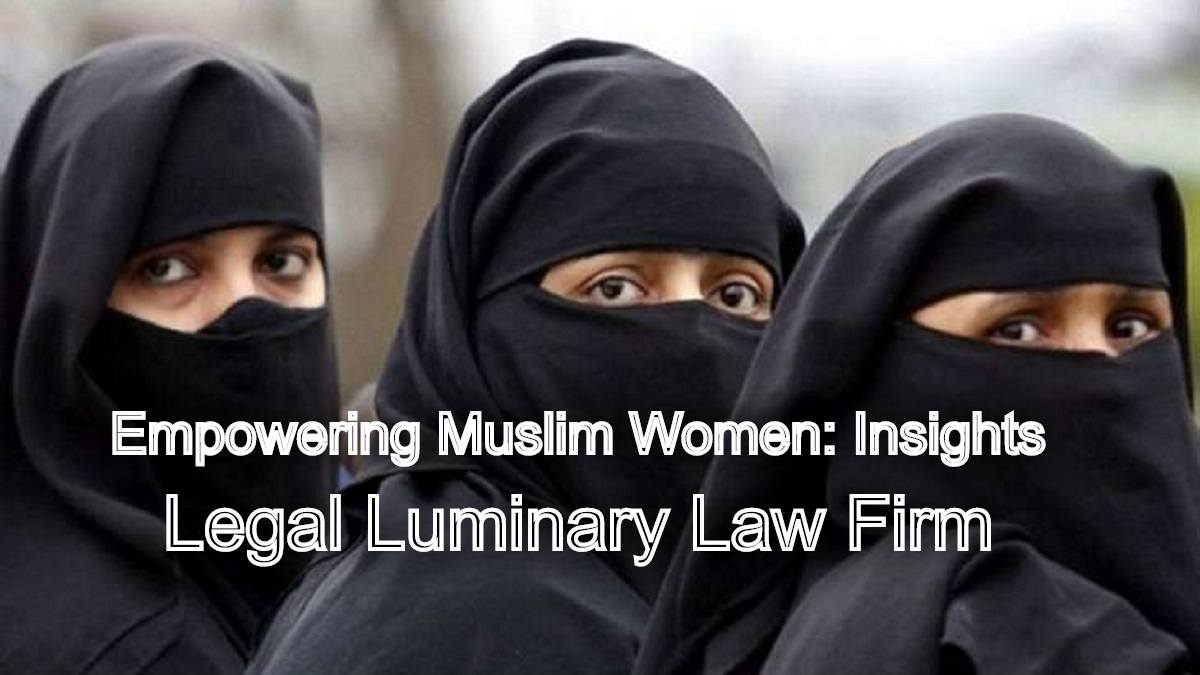Empowering Muslim Women: Insights into Muslim Women (Protection of Rights on Divorce) Act, 1986
Empowering Muslim Women: The journey towards gender equality has been a long and arduous one, particularly for women belonging to marginalized communities. In India, Muslim women have historically faced unique challenges, especially in matters of divorce and post-divorce rights. The Muslim Women (Protection of Rights on Divorce) Act, 1986, was a significant step forward in securing certain rights for divorced Muslim women. However, the complexities of this law and its implementation often leave women vulnerable and in need of legal support.
Empowering Muslim Women: Insights into Muslim Women (Protection of Rights on Divorce) Act, 1986: Legal Luminary Law Firm
Understanding the Muslim Women (Protection of Rights on Divorce) Act, 1986
Enacted in response to the Shah Bano case, the Muslim Women (Protection of Rights on Divorce) Act aimed to provide financial security to divorced Muslim women and their children. The act stipulates that the husband should provide reasonable and necessary maintenance to his divorced wife and minor children. However, the scope of this act and its practical implementation have been subjects of debate and controversy.
Legal Luminary Law Firm: A Beacon of Hope for Muslim Women
Amidst the complexities of the legal landscape, Legal Luminary Law Firm emerges as a beacon of hope for Muslim women. Their team of dedicated lawyers specializes in women’s rights and family law, with a particular focus on the rights of Muslim women. They possess a deep understanding of the Muslim Women (Protection of Rights on Divorce) Act, 1986, and its implications.
Comprehensive Legal Support for Muslim Women
Legal Luminary Law Firm offers a comprehensive range of legal services to empower Muslim women:
- Divorce Proceedings: Providing legal counsel and representation during divorce proceedings, ensuring fair settlements and protection of women’s rights.
- Maintenance Claims: Assisting women in claiming and securing maintenance for themselves and their children as per the provisions of the Act.
- Child Custody and Guardianship: Fighting for the best interests of children in divorce cases, securing custody and guardianship rights for the mother.
- Property Rights: Protecting the property rights of Muslim women, including rights to inherited property and matrimonial home.
- Domestic Violence: Offering legal support to women facing domestic violence, securing protection orders, and seeking justice.
The Legal Luminary Law Firm Difference
Several factors set Legal Luminary Law Firm apart from other law firms:
- Specialized Expertise: The firm’s lawyers possess in-depth knowledge of Muslim personal law and women’s rights.
- Empathetic Approach: They understand the emotional turmoil women face and provide compassionate support.
- Strong Advocacy: The firm is committed to aggressive advocacy to protect the rights of Muslim women.
- Accessibility: They offer affordable legal services to ensure that every woman has access to justice.
Frequently Asked Questions
A: The Act mandates husbands to provide reasonable and necessary maintenance to divorced wives and minor children. It also outlines provisions for the custody and guardianship of children.
A: Generally, the right to maintenance ceases upon remarriage. However, there might be exceptions based on specific circumstances.
A: Challenges include lack of awareness about the Act, financial constraints, social stigma, and difficulties in accessing legal aid.
A: Yes, the Act provides for the custody of minor children. The court decides custody based on the child’s welfare.
A: Legal Luminary Law Firm provides comprehensive legal support to Muslim women, including guidance on divorce proceedings, maintenance claims, child custody, property rights, and domestic violence.
Conclusion
Empowering Muslim women is a complex and multifaceted issue. The Muslim Women (Protection of Rights on Divorce) Act, 1986, was a significant step forward, but its implementation has been fraught with challenges. Legal Luminary Law Firm plays a crucial role in bridging this gap by providing unwavering support and legal expertise to Muslim women. Through their dedicated efforts, they are helping to create a more equitable and just society for all.
By seeking the assistance of Legal Luminary Law Firm, Muslim women can navigate the complexities of the legal system with confidence and strength. Remember, every woman deserves to live with dignity and respect.
Read More
- Constitution of India: Choose the Best Lawyers
- Property Transactions Simplified: Exploring the Transfer of Property Act, 1882
- Free Legal Advisory services
- Matrimonial Matters Simplified: Insights into Hindu Marriage Act, 1955
- Legal Solutions for Muslims: Understanding Muslim Personal Law (Shariat) Application Act, 1937
- National Commission for Minorities (NCM):

